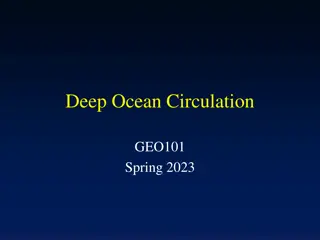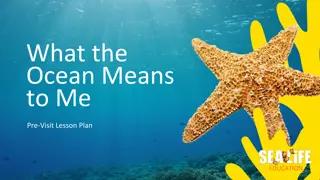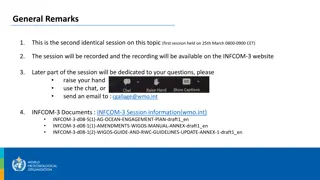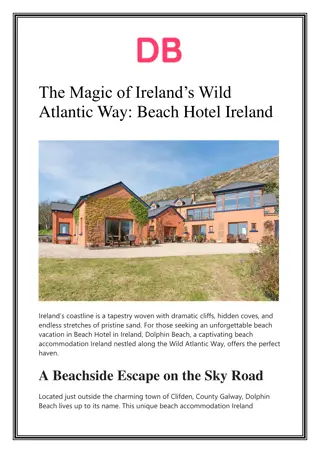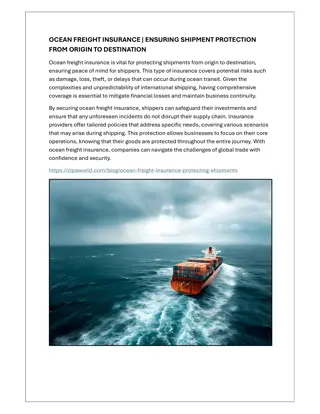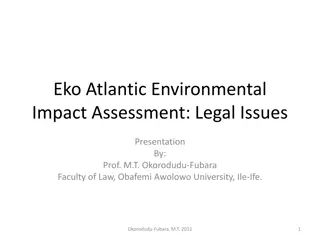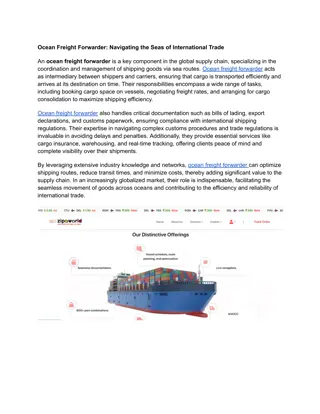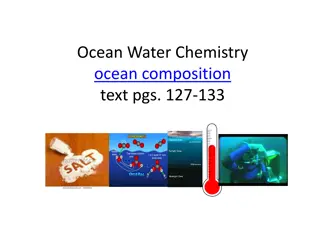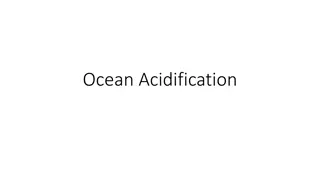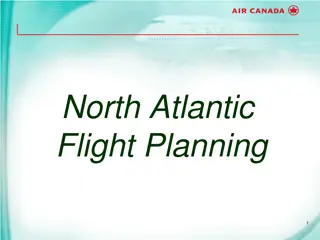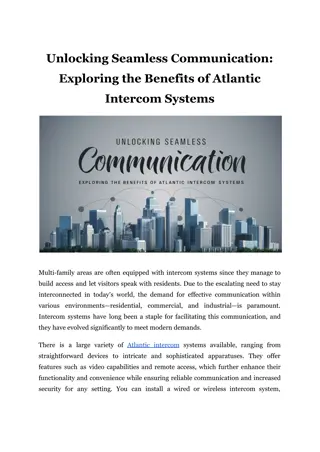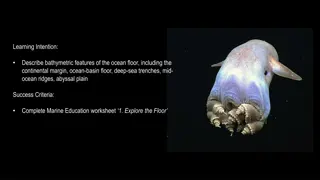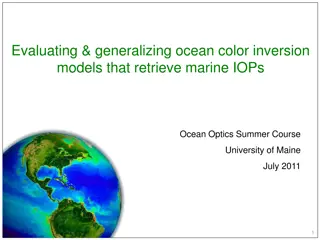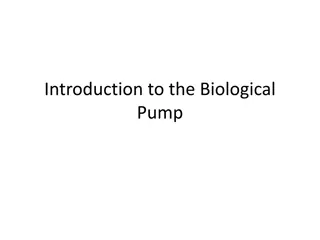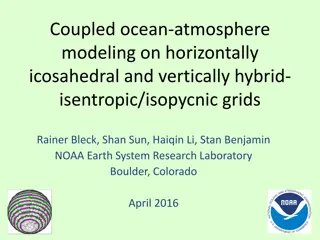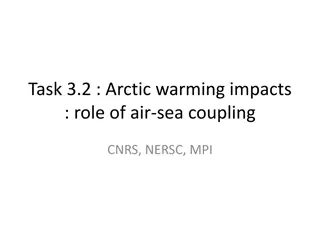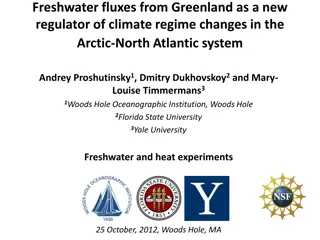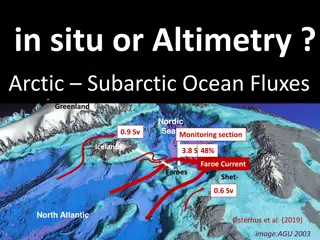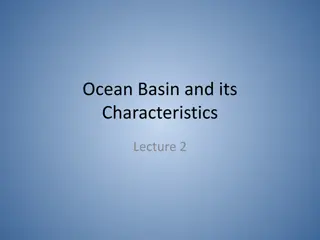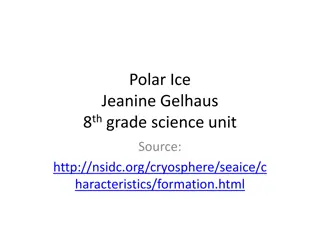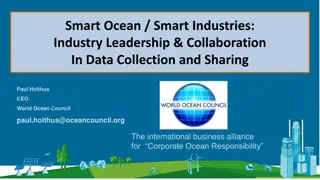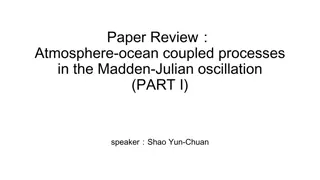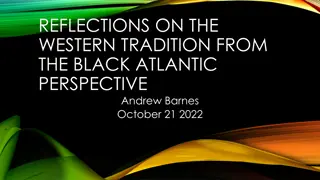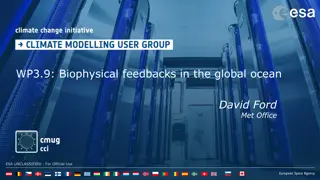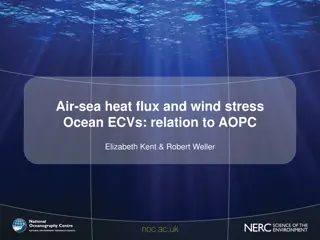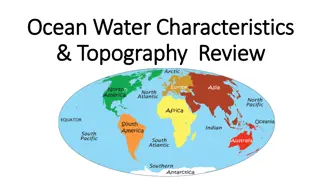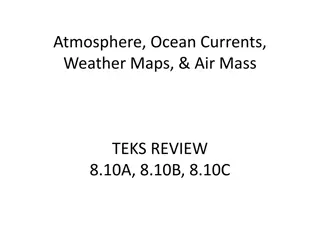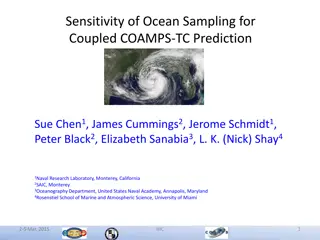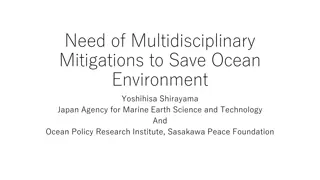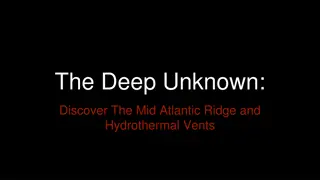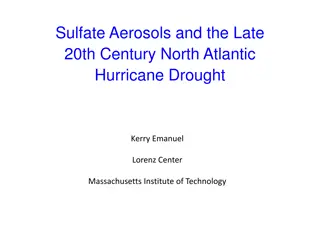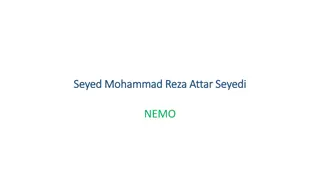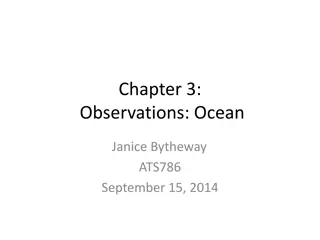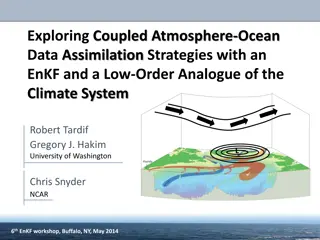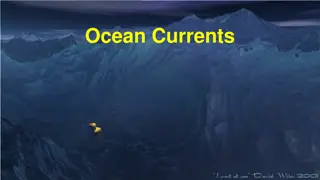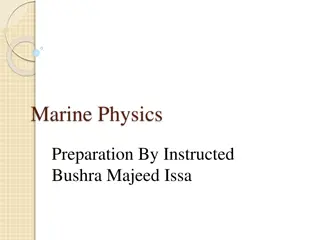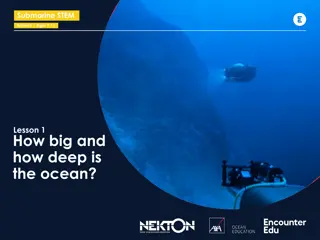Discovering Ocean's Challenges: Virtual Meetings with Researchers
Dive into the world of ocean exploration with your students through a series of virtual conferences with researchers and specialists, organized by the Tara Ocean Foundation. Explore topics such as ocean and climate, plastic pollution, plankton, and Arctic ice melting. Engage in presentations, Q&A se
0 views • 6 slides
Understanding Deep Ocean Circulation and Salinity Patterns
Explore the intricate relationship between ocean salinity, vertical structure, and deep-water currents in this informative collection of images and explanations. Discover how salt inputs and outputs influence ocean salinity levels, and learn about the factors that contribute to the vertical variatio
12 views • 21 slides
Exploring the Ocean: Pre-Visit Lesson Plan
Dive into a creative educational journey to explore the significance of the ocean and ways to protect it. Students will engage in activities such as creating a poem and campaign poster, fostering a deeper connection with the ocean and understanding the importance of recycling for ocean conservation.
5 views • 8 slides
AG-Ocean Engagement Plan: Enhancing Collaboration for Ocean Infrastructure Development
The AG-Ocean Engagement Plan aims to establish long-term working arrangements between WMO and the ocean infrastructure community to advance Earth System Approaches. AG-Ocean focuses on advisory roles, prioritizing key areas for impact. The plan identifies observations, data, and prediction as essent
1 views • 21 slides
The Magic of Ireland’s Wild Atlantic Way Beach Hotel Ireland
Ireland\u2019s coastline is a tapestry woven with dramatic cliffs, hidden coves, and endless stretches of pristine sand. For those seeking an unforgettable beach vacation in Beach Hotel in Ireland, Dolphin Beach, a captivating beach accommodation Ireland nestled along the Wild Atlantic Way, offers t
3 views • 4 slides
OCEAN FREIGHT INSURANCE | ENSURING SHIPMENT PROTECTION FROM ORIGIN TO DESTINATIO
Ocean freight insurance is vital for protecting shipments from origin to destination, ensuring peace of mind for shippers. This type of insurance covers potential risks such as damage, loss, theft, or delays that can occur during ocean transit. Given the complexities and unpredictability of internat
1 views • 1 slides
Overview of Workday at Florida Atlantic University
Workday is a cloud-based application software used by Florida Atlantic University for human resources, payroll, and financial functions. It offers integrated features like single sign-on access, personalized profiles, remote accessibility, and self-management tools. Users can run reports, receive no
0 views • 12 slides
Eko Atlantic Environmental Impact Assessment and Legal Issues Presentation
Prof. M.T. Okorodudu-Fubara from Obafemi Awolowo University presents on the Eko Atlantic Environmental Impact Assessment, focusing on legal requirements, the EIA process, preemptive measures, violations, and vital laws applicable to the project. The presentation outlines the planned project to dredg
0 views • 20 slides
Ocean Freight Forwarder: Navigating the Seas of International Trade
An ocean freight forwarder is a vital player in the maritime logistics industry, specializing in the efficient and cost-effective transportation of goods across seas and oceans. Ocean freight forwarder manages the intricate logistics of ocean shippin
1 views • 1 slides
Exploring Ocean Water Chemistry: Salinity, Saltiest Body of Water, and Gases
Delve into the complexity of ocean water chemistry, including the significance of salinity levels, the saltiest body of water on Earth at Don Juan Pond in Antarctica, the composition of salts in ocean water, and the role of gases like oxygen and carbon dioxide. Discover how these factors shape the c
0 views • 11 slides
Understanding Ocean Acidification: Impact on Coral Reefs
Ocean acidification is the process where oceans become more acidic due to excessive carbon dioxide absorption. Human activities like deforestation and vehicle emissions contribute to this phenomenon. Coral reefs are crucial as many ocean species rely on them for survival. The pH scale measures acidi
0 views • 18 slides
Challenges and Solutions in North Atlantic Flight Planning
Highlighting the complexities faced by airlines in North Atlantic flight planning, this presentation discusses the traditional methods, current problems, and objectives for more efficient operations. It addresses the impact of NAT traffic on domestic flows, the need for collaboration between domesti
0 views • 27 slides
Unlocking Seamless Communication_ Exploring the Benefits of Atlantic Intercom Systems
There is a large variety of Atlantic intercom systems available, ranging from\nstraightforward devices to intricate and sophisticated apparatuses. They offer\nfeatures such as video capabilities and remote access, which further enhance their\nfunctio
1 views • 5 slides
Exploring Bathymetric Features of the Ocean Floor
Explore the fascinating bathymetric features of the ocean floor, including the continental margin, ocean basin floor, deep-sea trenches, mid-ocean ridges, and abyssal plain. Learn about submarine canyons like the Cape Range Canyon near Ningaloo Reef in Western Australia, and discover rare marine lif
0 views • 37 slides
Evaluation of Ocean Color Inversion Models for Retrieving Marine IOPs
Evaluating and generalizing ocean color inversion models to retrieve marine inherent optical properties (IOPs) is essential for understanding ocean dynamics. This involves choosing the right algorithm and validating its effectiveness, as discussed in the Ocean Optics Summer Course at the University
0 views • 23 slides
Understanding the Biological Pump and Carbon Cycle in the Ocean
The biological pump in the ocean involves photosynthesis by phytoplankton, which removes carbon dioxide from the atmosphere, and respiration, where some CO2 is released back. Phytoplankton are crucial in the ocean's carbon cycle, with primary consumers like zooplankton depending on them for energy.
0 views • 20 slides
Coupled Ocean-Atmosphere Modeling on Icosahedral Grids
Coupled ocean-atmosphere modeling on horizontally icosahedral and vertically hybrid-isentropic/isopycnic grids is a cutting-edge approach to modeling climate variability. The design goals aim to achieve a global domain with no grid mismatch at the ocean-atmosphere interface, with key indicators such
2 views • 21 slides
Understanding the Impact of Arctic Warming Through Air-Sea Coupling
Investigate the role of air-sea coupling in amplifying or dampening the impact of Arctic warming on northern continents using coordinated coupled model experiments. Explore the mechanisms bridging Arctic impacts in the Northern Hemisphere via North Pacific sea surface temperature changes. Focus on t
4 views • 15 slides
Freshwater Fluxes from Greenland and Climate Regime Changes in the Arctic-North Atlantic System
Freshwater fluxes from Greenland are identified as a new regulator of climate regime changes in the Arctic-North Atlantic system. The Arctic Ocean Oscillation Index reveals two circulation regimes with alternating patterns. Correlations between the Arctic Ocean Oscillation and various environmental
1 views • 32 slides
Monitoring Faroe Current Transport with Satellite Altimetry and In-situ Observations
Combining satellite altimetry and in-situ observations offers a comprehensive approach to monitoring volume, heat, and salt transports in the Faroe Current. The study focuses on the representativeness of ocean observations in the Arctic and Subarctic regions, highlighting the importance of combining
0 views • 11 slides
Understanding Ocean Basins and Their Characteristics
Ocean basins are vast submarine regions that cover a significant portion of the Earth's surface, hosting the majority of the planet's water. These basins exhibit various features such as ocean ridges, deep-sea trenches, and seismic ridges. The ocean floor is constantly evolving due to plate tectonic
0 views • 18 slides
Seasonality of Particles Exported by the Southern Ocean Eddy Subduction Pump
The Southern Ocean Eddy Subduction Pump plays a crucial role in global carbon cycling, contributing significantly to the ocean's uptake of anthropogenic CO2. This research aims to characterize the seasonality and particle assemblage of the pump to better understand its role in carbon export. Various
0 views • 35 slides
Understanding Ocean Salinity and Freezing Points
Explore the world of ocean salinity and freezing points, from the formation of polar ice to the unique characteristics of the Arctic and Antarctica. Discover the composition of ocean water, the concept of salinity, measurement methods, average ocean salinity levels, and how both saltwater and freshw
0 views • 58 slides
World Ocean Council: Industry Leadership and Collaboration for Sustainable Ocean Business
The World Ocean Council is an international alliance promoting leadership and collaboration among ocean industries for sustainable use and stewardship. By bringing together various sectors like shipping, oil/gas, fisheries, and tourism, the council aims to create a responsible ocean business communi
0 views • 22 slides
Understanding Atmosphere-Ocean Coupling in Madden-Julian Oscillation
Atmosphere-ocean coupled processes in the Madden-Julian Oscillation (MJO) play a crucial role in intraseasonal oscillations. This paper review by Shao Yun-Chuan explores how the ocean's Sea Surface Temperature (SST) influences surface fluxes, MJO convection, and energy balance dynamics. It delves in
0 views • 17 slides
Black Atlantic Perspective: Critiques and Affirmations within the Western Tradition
The Black Atlantic Perspective offers a unique critique from within the Western tradition, challenging Eurocentric narratives and promoting the ownership of Western civilization by marginalized voices. Rejecting the label of a slave race, this perspective embraces Christian humanism while condemning
0 views • 7 slides
Biophysical Feedbacks in the Global Ocean Research Overview
Biophysical feedbacks in the global ocean, including the impact of chlorophyll on solar radiation penetration, SST, and climate variability, are under-studied in climate models. This research assesses the effects of assimilating ocean color data and incorporating sea state in air-sea flux parameteri
0 views • 5 slides
An Ocean of Opportunity: Exploring Ocean Observing at Conference OceanObs 19
Discover the latest insights on air-sea heat flux, wind stress, and atmospheric ECVs at the OceanObs 19 conference in Hawaii. Engage with 1200 ocean observing scientists, program managers, and policy experts to chart the next decade of ocean observing and enhance international collaboration on ocean
1 views • 16 slides
Exploring Ocean Water Characteristics and Topography
In 1992, a crate of rubber duck toys fell into the Pacific Ocean, leading to unexpected discoveries about ocean currents and pollution. The North Pacific Gyre, home to the Great Pacific Garbage Patch, plays a crucial role in understanding ocean dynamics. Learn about ocean water properties, distribut
0 views • 10 slides
Atmosphere, Ocean Currents, Weather Maps, & Air Mass TEKS Review
Explore key concepts related to atmosphere, ocean currents, weather maps, and air mass in this TEKS review. Understand the factors contributing to Earth's uneven heating, the role of convection in ocean currents, the energy sources that drive ocean convection, and the effects of heating on air densi
0 views • 21 slides
Sensitivity of Ocean Sampling for Coupled COAMPS-TC Prediction Study
This study explores the optimal ocean sampling strategy for Hurricane Isaac (2012) using high-resolution in-situ observations. It investigates the sensitivity of tropical cyclone intensity change through assimilation of AXBT, AXCTD, and AXCP observations. Results show significant impact areas along
0 views • 12 slides
Multidisciplinary Mitigations for Ocean Environment Conservation
Global ocean climate change poses significant threats to marine ecosystems, requiring multidisciplinary approaches for mitigation. Japanese research highlights expanding distributions of reef-building corals, deep-sea water temperature rise, ocean acidification impact on marine plankton, and thinnin
0 views • 4 slides
Discover the Mid-Atlantic Ridge and Hydrothermal Vents
The Mid-Atlantic Ridge is an underwater mountain range running from Iceland to the Antarctic, formed where tectonic plates meet and create new ocean floor. Hydrothermal vents, like chimneys, spew mineral-rich seawater due to interactions between cold seawater and hot molten rock beneath the Earth's
0 views • 8 slides
Understanding North Atlantic Hurricane Drought and Aerosol Impact
This study explores the influence of sulfate aerosols on the late 20th-century North Atlantic Hurricane drought, focusing on the interaction of European sulfate aerosols and African dust. It investigates the radiative forcing effects and variability in hurricane activity, proposing hypotheses relate
0 views • 17 slides
Understanding NEMO: European Ocean Modeling Software
NEMO (Nucleus for European Modeling of the Ocean) is a comprehensive software used for numerical simulation of the ocean. Its components include the blue ocean (NEMO-OPA) for dynamics, white ocean (NEMO-LIM) for sea-ice simulation, and green ocean (NEMO-TOP) for biogeochemistry. NEMO produces model
0 views • 10 slides
Insights on Ocean Climate Change: Observations and Implications
Observations in this chapter highlight significant changes in ocean properties related to climate over the past 40 years. These changes include shifts in temperature, salinity, sea level, carbon levels, pH, and oxygen content. The patterns of change observed suggest a link between surface and subsur
0 views • 35 slides
Exploring Coupled Atmosphere-Ocean Data Assimilation Strategies with EnKF
This study explores data assimilation strategies for coupled atmosphere-ocean systems using an Ensemble Kalman Filter (EnKF) and a low-order analogue of the climate system. Motivated by the growing interest in near-term climate predictions, the challenges of interacting slow and fast components of t
0 views • 21 slides
The Importance of Ocean Currents in Global Systems
Ocean currents play a vital role in transporting heat, nutrients, organisms, and influencing weather patterns and climates. They impact commerce, gas exchanges, nutrient exchanges, pollution dispersal, and fisheries. The interaction between surface and deep-sea currents forms the global ocean convey
0 views • 25 slides
Understanding Marine Physics and Ocean Floor Features
Marine Physics is a sub-domain of oceanography focusing on physical conditions and processes in the ocean, including ocean waters' motions and properties. The ocean floor features various elements like the continental shelf, slope, rise, and abyssal plain. Sea mounts, guyots, abyssal hills, and mid-
0 views • 15 slides
Exploring the Depths: Ocean Size and Importance
Dive into the fascinating world of the ocean with Lesson 1 of the Submarine STEM Science series. Discover the vastness and significance of our planet's oceans, how they impact life on Earth, and the essential role they play in our ecosystem and daily lives. Join Nekton Mission II as you embark on a
0 views • 13 slides

